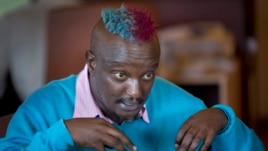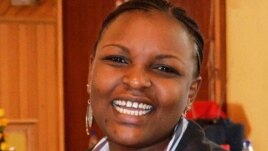 Award-winning Kenya author Binyavanga Wainaina publicly declared his homosexuality in January in response to anti-gay movements in Uganda and Nigeria
Award-winning Kenya author Binyavanga Wainaina publicly declared his homosexuality in January in response to anti-gay movements in Uganda and NigeriaThis is a interview i did with Voice of America (VOA) recently.
As Kenya lawmakers consider a law further oulawing homosexual behavior and gay activism, Jane Wothaya advocates for the rights of gay, lesbian, bi-sexual and transgender (LGBT) in Nairobi and from Washington, D.C. Even as African governments outlaw homosexuality in Uganda, Nigeria and elsewhere in Africa, Wothaya joins other activists who work "not very out and open" for human rights in her homeland.
Wothaya was frustrated by the negative publicity and stigma that surrounds this minority group in the Kenya media. So she joined the Gay and Lesbian Coalition of Kenya to correct what she characterizes as wrong perceptions about Kenyans who fit that description.
Wothaya is a lesbian who advocates for LGBT rights. She was named an Atlas Corps fellow and now works with the Human Rights Campaign on gay community issues in Washington, D.C.
Raising public awareness about gender issues is different in Kenya, she says.
“I work with a group that is relatively not very out and open in Kenya,” says Wothaya, “because while Kenya is not exactly a very conservative country, it’s a very religious country.”
Clergy contribute to the prejudice against Kenya's community
Kenya’s understanding of sexual orientation and gender identity is minimal, she says. There is a lot of prejudice based on the views of many of Kenya’s clergy and “there have been inciting statements made by politicians and a lot of misinformation and ignorance about issues related to sexual orientation and gender identity,” Wothaya says.
But it was social media and the mainstream press, radio and television that frustrated her the most. “For example, we had radio stations that did call-in sessions where people would call and talk about the Gay and Lesbian Coalition of Kenya as though it is the devil or something.
“And this was the kind of information that they were passing to their teenagers who were struggling to just get to know who they were and getting to discover what they were.”
Custom and tradition have perpetuated the problems for the gay community of Kenya. Wothaya describes “the issue of living in a patriarchal society where gender role and gender norms are passed on for years and years and so the prejudices and ignorance continue.”
Wothaya and her coalition colleagues engage the Kenyan community in public discussions on gender identity and sexual orientation. They raise sensitivity and awareness to allow the public to better understand and accept gay people.
The educational process is designed to get people to understand “that people don’t walk around with labels on their foreheads for you to see what their sexual orientation is. These people are your brothers, your sisters, your cousins, your employers and your employees.”
Wothaya discusses human rights violations with authorities
The Kenya coalition also documents and addresses violations that result from “Draconian laws". They take their concerns to police, policy makers and others.
Wothaya says the harsh treatment by the police – and others – is partially rooted in a punitive law inherited from British colonialists. The law prosecutes anyone “indulging in unnatural acts” or “acts against the order of nature.”
The current punishment for these acts is seven to 14 years in jail. While it is not as severe as the life sentence written into a new law that President Yoweri Museveni of neighboring Uganda has signed, the Gay and Lesbian Coalition of Kenya is working to remove its own lingering legacy of colonialism from Kenya’s legal system.


